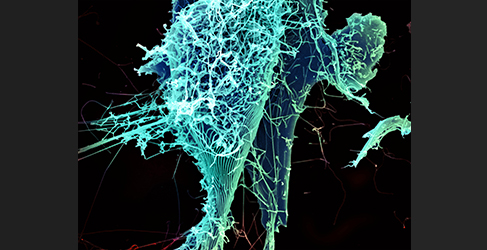Cybernetics and Society - 1 November 2016 - The Liberal Effect: System-Cybernetic Governmentality during the Cold War
Duration: 53 mins 11 secs
Share this media item:
Embed this media item:
Embed this media item:
About this item

| Description: |
Egle Rindzeviciute (Lecturer, Kingston University London)
Discussant: Franziska Exeler (University of Cambridge) Cybernetics and systems analysis – both important contributors to our contemporary information architecture – have been the subjects of highly critical historical analyses. Scholars such as Peter Galison, S. Amadae and Paul Edwards argue that the techno-sciences of cybernetics were instrumental in the development of Cold War military-industrial operations and influenced high modernist fantasies of top-down control. Yet, in her fascinating new book, The Power of Systems, Dr. Egle Rindzeviciute examines a little known period of Soviet-American cooperation to argue for an alternative political history – one that asserts an anti-totalitarian character to the development of systems and policy sciences during the late Cold War. Focusing her study on the International Institute for Applied Systems Analysis in Vienna, Dr. Rindzeviciute’s work explores a rare zone of freedom, communication and negotiation. Her research demonstrates how computer modeling, cybernetics and systems analysis challenged Soviet governance by undermining the linear notions of control on which Soviet governance was based and creating new objects and techniques of government. |
|---|
| Created: | 2016-11-02 10:58 |
|---|---|
| Collection: | Cybernetics and Society |
| Publisher: | University of Cambridge |
| Copyright: | Glenn Jobson |
| Language: | eng (English) |
| Keywords: | Egle Rindzeviciute; Franziska Exeler; |
| Abstract: | Egle Rindzeviciute (Lecturer, Kingston University London)
Discussant: Franziska Exeler (University of Cambridge) Cybernetics and systems analysis – both important contributors to our contemporary information architecture – have been the subjects of highly critical historical analyses. Scholars such as Peter Galison, S. Amadae and Paul Edwards argue that the techno-sciences of cybernetics were instrumental in the development of Cold War military-industrial operations and influenced high modernist fantasies of top-down control. Yet, in her fascinating new book, The Power of Systems, Dr. Egle Rindzeviciute examines a little known period of Soviet-American cooperation to argue for an alternative political history – one that asserts an anti-totalitarian character to the development of systems and policy sciences during the late Cold War. Focusing her study on the International Institute for Applied Systems Analysis in Vienna, Dr. Rindzeviciute’s work explores a rare zone of freedom, communication and negotiation. Her research demonstrates how computer modeling, cybernetics and systems analysis challenged Soviet governance by undermining the linear notions of control on which Soviet governance was based and creating new objects and techniques of government. |
|---|---|

